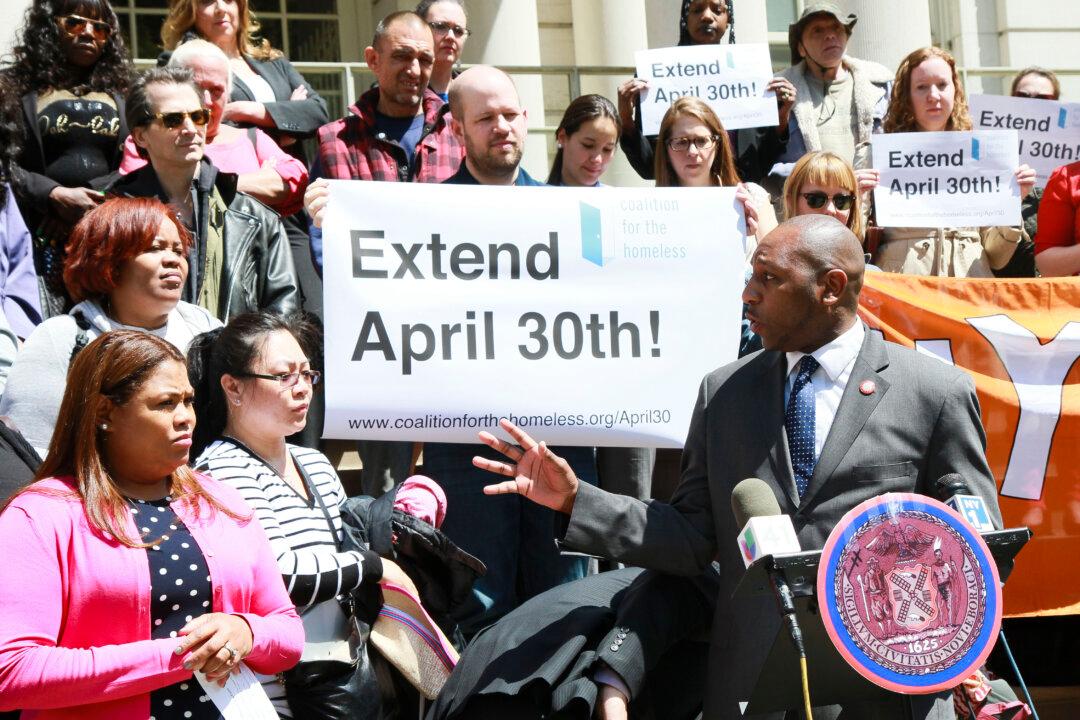NEW YORK—Some of the New York City residents made homeless by Sandy might be eligible for up to two years of federal rental assistance, but the program is still uncertain, making it difficult for the city to rely on the money for its decision making.
On Monday, a state Supreme Court judge intervened and granted temporary reprieve to the nearly 500 households at risk of homelessness after a lawsuit was filed by Legal Aid and Weil, Gotshal & Manges LLP on the homeless Sandy victims’ behalf.
The city had set an April 30 eviction deadline to end its interim hotel assistance program, leaving around 200 households at risk of homelessness. The extension gives them a lifeline, a new deadline of May 15.
The people in the hotel system face a variety of complex circumstances. Forty-three households are waiting for home repairs, and another 249 are in the process of getting city assistance. These people were already offered an extension by the city.
At risk were 71 households that had been offered housing and refused according to the Department of Homeless Services (DHS).
An additional group of 125 households now staying in the hotels was also outside of any current city program, and faced eviction. Under New York City Housing Authority (NYCHA) rules, these households are ineligible for assistance for a variety of reasons, including a criminal history, insufficient income, and past NYCHA tenancy problems.
Close to 200 of the most vulnerable households still face the possibility of another eviction notice come May 15 unless another solution can be found.
A revised version of the city’s Community Development Block Grant recently submitted to the federal government could be just the solution these people need. The revised proposal includes a rental subsidy clause commonly known as “synthetic vouchers,” that would allow for up to two years of rental assistance for qualified individuals, according to DHS Commissioner Seth Diamond.
HUD (U.S. Department of Housing and Urban Development) has 45 days to respond to the proposal, which was submitted April 23.
During a City Council hearing last Friday, council member Stephen Levin (Brooklyn, 33rd) appealed to extend the hotel program past the April 30 deadline to allow time for the anticipated federal vouchers, which would come from the U.S. Department of Housing and Urban Development.
Both the Department of Housing Preservation and Development and Brad Gair, the director of housing recovery operations for the mayor’s office, are telling Legal Aid that there are going to be synthetic vouchers “coming down the pipes,” said Levin.
The synthetic voucher is part of a larger $1.8 billion federal aid package that includes measures for reimbursement for out-of-pocket repair expenses incurred by homeowners, greater flexibility in choosing contractors for home repairs, business recovery, and infrastructure resiliency.
On Wednesday, Sen. Charles Schumer (D-N.Y.) announced a plan to increase federal aid for recovery costs. He has also been outspoken about homeless victims living in the city’s hotel system.
“Most of these people are not laggards,” said Schumer at his Manhattan office during a press conference Wednesday.
“They’re not just trying to get a free hotel room. Most people would much rather be in their houses, so I’ve been for leniency and letting people who just can’t move back or don’t have relatives nearby stay in the hotels,” Schumer added.
During last week’s hearing, Council member Levin repeatedly asked DHS to hold off on ending the hotel program and wait for the synthetic vouchers, for fear of losing track of the people who are some of the city’s most vulnerable.
“Right now they’re in the system,” said Levin. “If this resource becomes available in 45 days ... the prudent thing to do is keep track of these guys, is keep them in the system, extend the program for at least another 45 days, because if we don’t do that, I have a big fear that we’re going to lose track of them.”
DHS is dubious about whether the vouchers are a viable, option, though.
“That’s a proposal at this point that has not been approved,” said Diamond during the Friday hearing.
“We will stay in touch with the families who leave [the hotel program] and make them eligible for the [synthetic voucher] program to the extent that they are eligible.”
But Diamond repeatedly said during the hearing that there are many uncertainties about the HUD funding.
“They may endorse it, they may turn it down, we don’t know,” said Diamond. “The timing is uncertain, the eligibility is uncertain, the exact process to put it in place is uncertain.”




